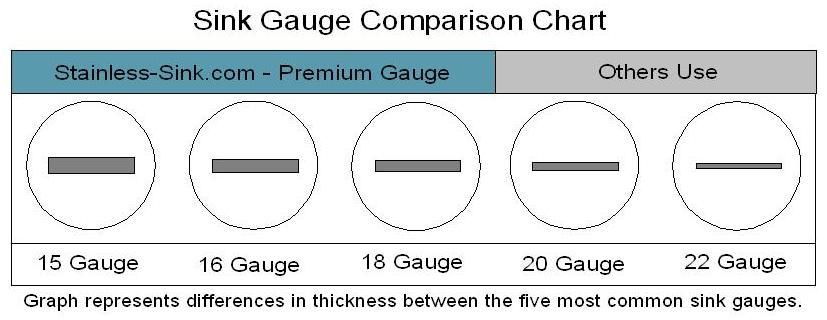It’s critical to consider all the elements that affect the quality and longevity of your products as a sink retailer and wholesaler. Although sink thickness might not be the first thing that comes to mind in this case, it is a vital consideration when determining a sink’s durability and noise-canceling abilities.
The durability of thick sinks is well known, and they can also reduce noise from running water or clanging dishes. Since it can help ensure customer satisfaction and establish a strong reputation for you, this is especially crucial for those who import and wholesale sinks in the USA.
Advantages of Thick Material Sink
When choosing a sink, thickness is an important consideration. A thicker sink is a dependable option for a busy kitchen because it is more reliable and resistant to wear and tear. In addition, a quieter environment is produced by thicker sinks, which are also effective at reducing noise in the kitchen or bathroom.
Understanding the advantages of sink thickness can help you ensure customer satisfaction, establish a strong brand reputation, and eventually save money.
1. Durability
The durability of a sink is significantly influenced by its thickness. A thicker sink can withstand heavy impacts without breaking and is less likely to get dented or scratched. A thicker sink will last longer and require less maintenance over time because it is more resistant to wear and tear.

Durability is a crucial factor to consider when choosing sinks for your customers. They value durable, dependable products, and a sink with increased durability can give customers peace of mind and satisfaction. A durable sink must also be replaced less frequently, saving wholesalers and retailers money.
A sink’s thickness is measured in gauge, where a lower gauge corresponds to a thicker sink when choosing the appropriate thickness. A sink gauge of 16 or 18 is typically regarded as a good benchmark for durability. A practical option for high-traffic kitchens is a thicker gauge stainless steel sink, offering greater structural integrity and resistance to wear and tear.
2. Noise reduction
The ability of sink thickness to dampen noise in the bathroom or kitchen is another advantage. Running water, clanging dishes, and other activities in the sink cause vibrations, which thicker sinks absorb. Thicker sinks have a higher mass and density, which makes them more effective at dampening noise. This is crucial in open-concept kitchens where sound spreads.
Noise reduction is a crucial factor that can create a relaxing and tranquil environment for a customer, and a sink that can minimize noise can help with this. Apartment buildings, and commercial kitchens, where noise can easily be transferred between units, may find noise reduction particularly important.

To sum up, a sink’s durability and noise-reduction abilities are significantly influenced by its thickness. Because thickness can lead to longer-term cost savings and higher customer satisfaction, wholesalers should consider it when choosing and advising sinks to their clients.
Factors Affecting Sink Durability
Durability should be taken into consideration when choosing a sink. In addition to lasting longer, a sink that can withstand daily use will ultimately cost less for maintenance. The gauge of the sink, the quality of the stainless steel, the presence of noise-canceling pads, and anti-condensation coatings are a few factors that affect sink durability.
To give you a thorough understanding of what to look for when choosing durable sinks for their clients, we will detail each of these factors in this response.
1. Sink Gauge
Lower numbers denote a thicker gauge, and the sink gauge is measured between 16 and 22, referring to its thickness. The sink’s durability is significantly influenced by its thickness because thicker sinks are more durable against dents and scratches. A thicker gauge sink will also endure longer, necessitating fewer repairs or replacements.

A gauge of 18 or less is typically advised for increased durability. It’s important to remember that thicker gauge sinks may cost more than thinner gauge sinks. Balancing cost and toughness is crucial when choosing a sink for a specific application.
2. The grade of stainless steel
The durability of a sink can also be impacted by the grade of stainless steel used in it. The two most popular grades are 304 and 316, with 304 being more widely used due to its accessibility and resistance to corrosion. But 316-grade stainless steel offers even better durability and corrosion resistance, making it an excellent option for sinks in demanding environments.
Sinks of stainless steel are composed of an alloy with at least 10.5% chromium, forming a barrier that deters corrosion. The sink will be more corrosion-resistant the higher the chromium content. Molybdenum is one more element that can be added to the sink to increase its durability and resistance to corrosion.
3. Noise reduction pads and Anti-Condensation Coating
Anti-condensation coating and noise reduction pads are two elements that may affect how long stainless steel sinks last. To lessen noise from water running through the sink, noise reduction pads are typically installed on the underside of the sink and made of rubber or foam. By absorbing vibrations and limiting excessive movement, they also aid in preventing damage to the sink.

On the other hand, the anti-condensation coating is a layer applied to the underside of the sink to stop the accumulation of moisture brought on by condensation. This coating prevents condensation by forming a barrier between the air and the sink. As a result, retailers can choose and suggest more dependable and damage-resistant sinks.
To wrap it up, a stainless steel grade, the gauge of the sink, the presence of noise-canceling pads, and anti-condensation coatings, all affect sink durability. Higher-grade stainless steel and thicker gauge sinks are typically more damage resilient; noise reduction pads and anti-condensation coatings can help a sink last longer. It is essential to consider all these factors to choose sinks that will last the longest possible and satisfy customers.
Conclusion
Although many businesses offer thick sinks, Chica Dragon stainless steel sinks are a favorite due to their excellent quality and finish. In addition, they are a top provider of numerous expertly crafted and customized sink designs.
Chica Dragon can give you a thick sink, which is essential for durability and noise reduction. In addition, higher-grade stainless steel sinks and thicker gauge sinks are typically more resilient to damage.
Chica Dragon pays close attention to each aspect to maximize durability and client satisfaction when choosing and advising sinks. As a result, manufacturers and wholesalers of sinks can offer their customers high-quality sinks that are durable and meet their needs by considering these factors.










